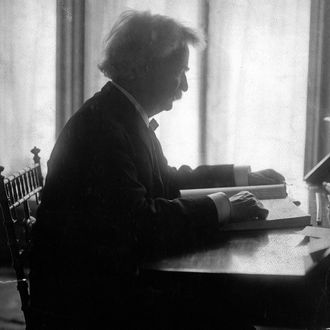
Ask seasoned writers to come up with an ending to an unfinished short story, and their brains seem to switch into a sort of automatic story-sculpting mode, which may leave them leftover brainpower to focus on the story’s emotion. That’s one of the findings from a new study published in NeuroImage comparing brain scans of expert and beginner fiction writers.
Researchers gave 20 expert writers (who had at least a decade of experience and wrote about 21 hours a week) and 28 newbies (who wrote less than an hour a week) the first part of a story, and asked them first to brainstorm the ending, and then to spend just two minutes writing the rest of the story. All the while, they were lying in a brain scanner. Here’s a neatly summarized take on what the scans showed, from the British Psychological Society’s Research Digest:
In the frontal cortex, expert brains showed greater activity in areas crucial to language and goal selection, including across the inferior frontal gyri (IFG). Verbal creativity has been associated with left IFG activation many times before, but involvement of the right IFG was unexpected. The area is associated with emotional language processing, such as interpreting expressive gestures, so this may suggest that experts are attending more deeply to the emotional currents of text and their ideas.
Expert writing also involved more activation in the left caudate. This is part of the basal ganglia, long known to be critical to learning and expert performance, and seems to reflect ordinarily cortical cognitive processes becoming automatised and bundled together within the deeper brain.
During the brainstorming phase, the expert writers’ brains became active in the area associated with speech processing, suggesting that, for experienced writers, “ideas bubble within them, already on the road from concept to expression, readily communicable, almost rising into their throats” as Alex Fradera on the Research Digest blog phrased it.
We’ll leave you with a line from one of the expert writers’ completed stories. When asked to finish the tale of a bachelor who killed himself in a laundromat, the writer concluded the piece with the phrase, “Unmade laundry, unloved days.” Not bad, considering this person wrote it in two minutes while lying in a brain scanner.




